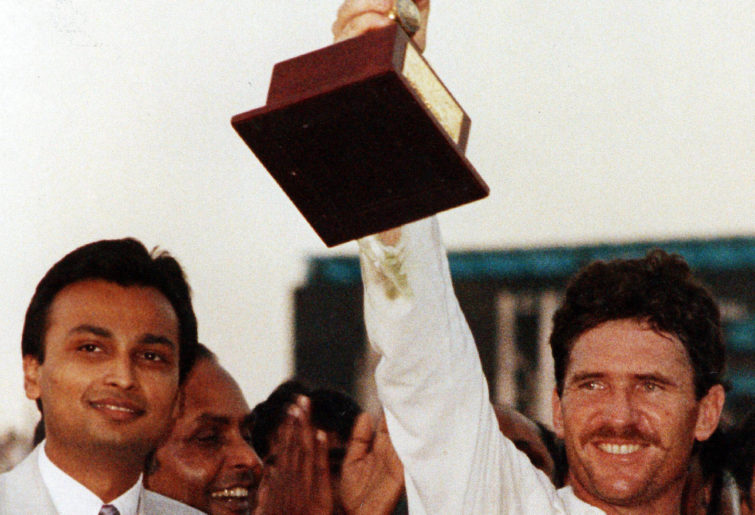Mitchell Starc finds IPL form with three wickets in Kolkata's win against Stoinis' Lucknow
With only two wickets in four games leading into the game, the Aussie paceman finished with 3/28 as his Knight Riders recorded an eight-wicket…
After looking back on 1975 yesterday, below are more World Cup nail-biters in this series.
England beats New Zealand by nine runs in Manchester in 1979
It was touch and go but England won narrowly to enter the final. England were engaged in two thrillers within four days and won both times. After beating Pakistan by 14 runs at Leeds, they met a confident New Zealand in the semi-final at Manchester.
Sent in to bat, England made 8 for 221 in 60 overs. Skipper and opener Mike Brearley scored a steady 53, Graham Gooch a confident 71 and Derek Randall an unbeaten 42. But legendary New Zealand fast bowler Richard Hadlee tied down his opponents.
A six from Gooch remains memorable in my mind. It soared high and went through the sightscreen, leaving a hole on the ground which remained unrepaired for many years!
New Zealand was given a good start by skipper John Wright (69) and Bruce Edgar (17) but the pace bowling of Michael Hendrick and electrifying fielding by Randall restricted their run chase.
It went down to the wire as the Black Caps needed 43 runs from the last five overs. There was drama when Warren Lees hit Hendrick hard and high to long on. Geoff Boycott got under the ball and caught it. However, his feet touched the boundary rope and it was signaled as a six.
In the final over, 14 runs were needed but England’s master all-rounder Ian Botham conceded only four runs and England won by nine runs to enter their first World Cup final, which they lost to the mighty West Indies by 92 runs at Lord’s.
Gooch’s aggressive innings earned him his second man of the match award within a fortnight.
Australia beats India by one run in Chennai, 1987
The 1987 tournament was played outside the UK for the first time and was comprised of 50-over matches.
Australian cricket was in the doldrums during the mid-1980s after the simultaneous retirements of Greg Chappell, Dennis Lillee and Rod Marsh and the loss of key players due to rebel tours to apartheid-era South Africa.
No one expected Australia to enter the semi-final, let alone lift the trophy.

Allan Border lifts Australia’s first World Cup in India in 1987. (AP Photo/Sondeep Shankar)
This changed after their first match against India in Chennai. Australia scored 6 for 268 after Geoff Marsh (110 off 141 balls, hitting one six and seven fours) and David Boon (49) put on 110 runs for the opening wicket.
The alert Australian manager Alan Crompton had noticed that a hit from Dean Jones signaled as a four was actually a six. At lunch, Crompton, the umpires and captains Allan Border and Kapil Dev watched the video and two runs were added to the total. The win target now became 271.
India started their reply confidently and were 2 for 207 with sparkling batting from Sunil Gavaskar, Kris Srikkanth and Navjot Sidhu.
Gavaskar’s stroke play delighted columnist Henry Blofeld, who described Sunil’s back foot drive off Craig McDermott as “the stroke of the year”. When Gavaskar hit off-spinner Peter Taylor for a four and a six, the huge crowd of nearly 40,000 went ecstatic.
But in a devastating second spell, McDermott took four wickets. In the last over India needed six runs for a win with the last man Maninder Singh on strike.
‘Ice-man’ Steve Waugh conceded two runs from his first two deliveries but sent the bearded Maninder’s off stump cartwheeling out of the ground off the fifth ball and Australia won by one run. This stunned the capacity crowd into silence but the Australians players were in raptures, celebrating as if they had won the World Cup.
For his century, Marsh was adjudged man of the match but many said tongue-in-cheek that his manager Crompton was the real hero.
This thriller was played a little over one year after the famous tied Test – same opponents, same venue and almost the same result.
More World Cup cliff-hangers will be featured in part three.